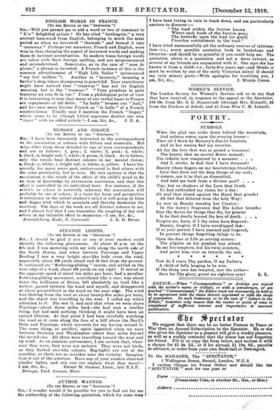ENGLISH WORDS IN FRANCE.
[To THE EDITOR OF THE " SPECTATOR."] Stn, Will you permit me to add a word or two of comment to " S.'s" delightful article ? He has cited " boulingrin," a very ancient loan-word from English, belonging to much the same period as when we borrowed " chaussee " and turned it into
causeway." Perhaps our ancestors, French and English, were wise in thus changing the aspect of borrowed words and making them fit national accentuation. In modern times foreign words are taken with their foreign spelling, and are mispronounced and misunderstood. Sometirdes, as in the case of " nom de plume," a phrase is invented. A French instance of this is the common advertisement of " High Life Tailor " (pronounced
" eeg leef tailleur "). Another is "lavatory," meaning a barber's shop where shampooing is practised. Your contributor might have noticed that " tramway " has not its English meaning, but is the " tramcar." " Vous prendrez le petit tramway au coin de la rue." From a philological point of view it is interesting to note that many of our verbal loans to France are repayments of old debts. "Lie halle" became our " hall," and has once more become French as " le halle " of a French country-house. Finally may I mention the French "lingot," which seems to be (though Littre expresses doubts) our own
" ingot " with an added article ?—I am, Sir, he., J. D. A.


















































 Previous page
Previous page